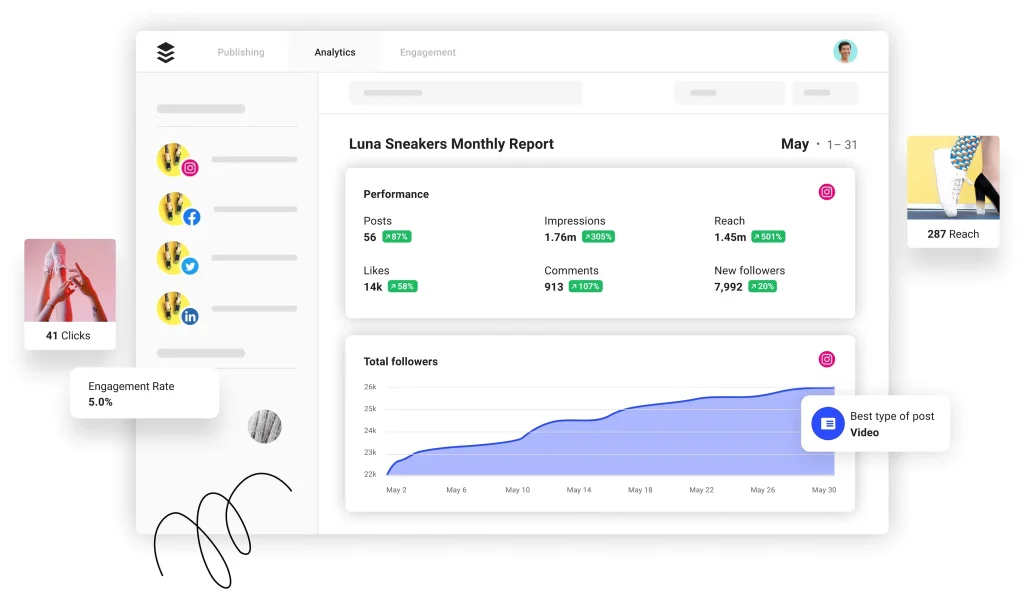Are you feeling frustrated with your social media presence?
Do you feel like you’re doing everything right, yet somehow still not getting the results that you hoped for?
It might be time to conduct a social media audit.
A thorough audit of your current efforts will give you valuable insights and help inform better decisions in the future.
It’s like getting an X-ray of what’s working and what needs improvement — so that together, we can aim for success!
But how do you even perform a successful audit?
And what questions should be asked during this process?
In this blog post, I’ll share the essential questions to ask when conducting a comprehensive social media audit for maximum results.
Why Conduct A Social Media Audit?

Conducting a social media audit is essential to the success of any business that wants to build an effective presence across these channels.
A social media audit helps you gain insight into how your audience perceives your brand, which platforms are best-suited for engaging them, and what content resonates with them the most.
It also allows you to track the performance of your campaigns and compare it against competitors in order to make improvements and stay ahead of the game.
It’s also a great way to identify areas where you could be doing better so that you can make data-driven decisions about how best to reallocate resources or adjust your strategy.
In short, conducting regular social media audits ensures that you’re taking full advantage of all available opportunities for growth on these platforms!
How To Conduct A Social Media Audit?
To get started with your audit, first determine which platforms you’d like to include in the review.
Most likely this will include at least Facebook, Twitter, LinkedIn and Instagram; however, it’s important to consider any other channels where you have an active presence as well.
Once you’ve identified which platforms to include in the audit, it’s time to begin collecting data from each account such as follower growth rate and engagement metrics.
You can use analytics tools or web reporting tools such as Google Analytics or Sprout Social to track key numbers over specific periods of time.
You should note any changes in branding or messaging that have occurred since the last audit.
Once this is done, set aside some time for qualitative analysis – observing trends within recent posts including content type (photos vs videos) and captions used – by scrolling through your newsfeeds manually so that nothing goes unnoticed.
What Are The Key Metrics To Consider During A Social Media Audit?

When conducting a social media audit, it’s important to assess the performance of your current strategies by looking at key metrics such as reach and engagement.
Reach refers to the number of people who have seen your posts, while engagement is the number of interactions with your posts (likes, comments, shares).
You should also consider other metrics such as impressions (the number of times content appears on someone’s timeline), click-through rate (the percentage of people who click on a link in your post), and conversion rate (the percentage of people that take action after viewing your post).
It’s also recommended to track metrics like sentiment analysis which looks at how positively or negatively people respond to your content.
This will help you understand how effectively you are communicating with your followers and provide insight into what kind of content resonates with them.
Which Social Media Platforms Should You Include In Your Audit?

When it comes to auditing your social media presence, you want to make sure you have all the bases covered.
This means that you need to include all of the platforms your business currently uses in your audit.
We recommend starting with some of the more established platforms: Facebook, Instagram, Twitter, TikTok and LinkedIn.
You’ll also want to audit any other platforms you are using such as YouTube or Pinterest.
For each platform make sure that your accounts are up-to-date and accurately reflect your brand’s messaging and values.
What Are Some Common Social Media Audit Mistakes To Avoid?
Making mistakes during a social media audit can lead to poor results.
Some of the most common mistakes include failing to track competitor data, not paying attention to user sentiment, and not keeping up with changes in the industry or trends in your target market.
Remember that a social media audit isn’t the same as an analytics review—you’ll need different metrics for each.
When conducting your audit, focus on gathering data that is truly relevant and meaningful for your brand.
Don’t get distracted by vanity metrics such as Likes or retweets—instead focus on more actionable insights such as engagement rates and customer reviews.
How To Analyze Your Social Media Audience During An Audit?

As part of a social media audit, analyzing your audience should be one of the first steps.
Knowing who is engaging with your content and why can give you an invaluable insight into how to optimize future campaigns.
Take time to identify any patterns among those who engage with your posts and look at some key metrics like age, location and gender.
Also consider what types of content resonates more with certain segments – for example, do images perform better than videos or vice versa?
Look beyond traditional demographics too – are there interests or habits that could help you target different audiences?
Analyze the conversations around each post to understand the sentiment behind it.
This will help you gauge if people are talking positively about your brand or not.
All these insights should be used to determine which strategies are working well and which need improvement as part of your social media audit process.
What Are Some Best Practices for Conducting A Social Media Audit?
To get started it is important to have a clear understanding of your goals and objectives, as well as an understanding of the key performance metrics you want to track.
Some best practices for conducting a social media audit include:
– Set realistic goals
– Be consistent with data collection
– Track all relevant analytics
– Look at competitor accounts and trends in your industry
– Use both qualitative and quantitative data when assessing results
– Take into account the changing landscape of each platform
– Utilize third-party tools where necessary (such as scheduling software)
– Regularly revisit past campaigns that have been successful or unsuccessful in order to make informed future decisions
You should establish benchmarks against which you can measure success.
Doing this will allow you determine if any changes need to be made over time in order for you to reach your desired outcomes.
What Are The Benefits of Regularly Conducting Social Media Audits?

Having a regular social media audit process in place will help you track your progress over time and compare it to industry standards.
A regular audit also allows you to identify any weak points in your strategy before they become too severe.
Auditing can also serve as an opportunity to reset goals and re-evaluate what’s working, what isn’t, and adjust accordingly.
Gathering this type of data on a regular basis allows you to make strategic decisions about the future of your social media presence and how best to utilize it for maximum growth.
By regularly conducting social media audits, you will be able to stay up-to-date with the latest trends in the industry and tailor your content to resonate with your audience.
How To Use Your Social Media Audit Findings To Improve Your Strategy?
Once you have gone through the process of conducting your social media audit, you’ll want to make use of your findings.
Your audit should give you a clearer picture of how your current strategy measures up against industry standards and what areas need improvement.
To get the most out of your findings, consider setting S.M.A.R.T goals for each metric you tracked during the audit —specific, measurable, achievable, realistic and timely—so that you can begin to take actionable steps towards improving them over time.
Look into ways to automate processes that are labor-intensive or resource-heavy so that more time can be devoted to engaging with customers and developing effective content strategies tailored for each social platform on which you’re active.
By taking advantage of the insights gained from an audit and putting processes in place for continuous improvement, you can rest assured knowing that your social media presence will remain competitive and relevant in today’s digital landscape.
What Tools Can Help You Conduct A Social Media Audit More Effectively?

Conducting a social media audit can be a time-consuming process, since you need to look at all of your profiles and analyze various metrics.
Fortunately, there are tools which can help streamline the process and help you get insights faster.
Some of the best tools for conducting a social media audit include Sprout Social, Hootsuite, Buffer, Brandwatch Audiences and Simply Measured.
These tools allow you to track key metrics such as follower growth, engagement rate and sentiment score in order to assess how successful your campaigns have been.
You can also use some of them to conduct competitor analysis or demographic research on your target audience so that you create content that resonates with them.
Conclusion
Conducting a social media audit can be an invaluable tool to help you understand how your business is performing on different platforms.
A thorough evaluation of metrics like engagement rate, follower growth and sentiment analysis can provide insights that will help you identify areas for improvement and create more effective campaigns.
While it may seem like there are many challenges associated with undertaking a successful audit, following best practices, avoiding common mistakes and leveraging the right tools can make the process much easier.
The irony here is that while we have discussed all of the steps that need to be taken in order to successfully conduct a social media audit, we often forget one crucial aspect – taking action!
Too often I see businesses who go through the motions but never actually take the time to implement any changes based on their results.
Without this step, all of your efforts will be wasted as you won’t be able to measure any progress or ROI from your campaigns.
So don’t just do an audit – act on what you find out when doing so!

